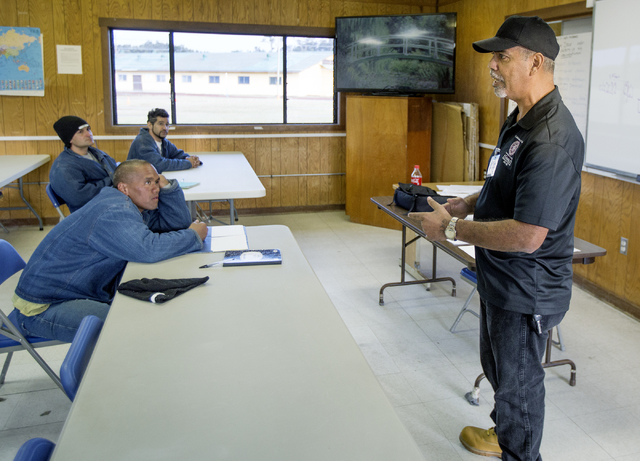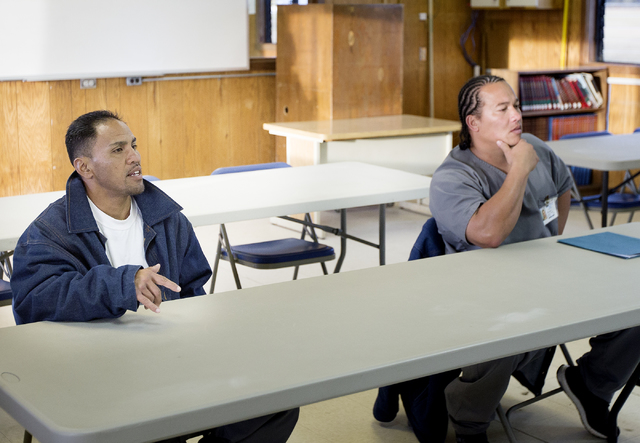Learning to change: Education program putting Kulani inmates on right course
Dustin Jose, a 35-year-old inmate from Kona, is poised on the edge of a plastic folding chair, listening attentively. It’s just after 5 p.m. Tuesday and class is in session at the Kulani Correctional Facility. Jose, wearing a gray prison uniform, is pondering an offbeat question.
ADVERTISING
“If you died today, how would people remember you?”
Jose isn’t sure.
“The first time I heard that (question), I went home and just kept thinking and thinking about it,” Jose told the Tribune-Herald after class, as fellow inmates shuffled past the prison’s wood-paneled instruction room. “And I realized, ‘Damn. I’ve been running the world hard and I don’t care about anyone but me.’”
It wasn’t your ordinary lesson, but then again, this wasn’t your ordinary class. This was “Transition Skills,” one of nine courses offered to Kulani inmates through Hawaii Community College’s noncredit division, the Office of Continuing Education and Training.
Skills for the future
More than 130 inmates are enrolled in the HCC courses, which include Hawaiian culture, hydroponics, facilities maintenance and computer programming, to name a few. The college offers them in an effort to help inmates gain skills and training needed to more successfully reintegrate into society upon release.
Windward Community College features a similar partnership with an Oahu correctional facility and Kauai Community College is considering an inmate education program.
Statistics show incarcerated adults who complete education and vocational training while behind bars are less likely to re-offend than those who don’t.
“The challenge that many service providers (for incarcerated adults) have is helping them even get employed at all,” said Jessica Yamamoto, director of HCC’s Office of Continuing Education and Training. “That’s a challenge they face because when they come out, they’re not necessarily trained in any particular skill. So for us, (these courses) are really to make sure they are employable. We want to provide them at least some education to make them more employable so that that they are more successful when they come out.”
Courses range from a few weeks to a few months and all are noncredit. But HCC — currently reworking a new contract with the Department of Public Safety — is looking at ways to expand offerings and give inmates an opportunity to eventually earn credit, should they choose to continue their education upon release.
A noncredit course could be applied toward a degree program through a process at the community college called Prior Learning Assessment, which allows students to earn college credit for what they already know.
Transition Skills could potentially be taught as a human services class, Yamamoto said.
‘Change is possible’
A total of five inmates were spread out around the room Tuesday, gazing fixedly at the front. Transition Skills teaches them ways to succeed in future work, develop confidence, communicate and listen effectively — ultimately, glean “fundamental social and life skills” which they might lose or not develop while behind bars.
That’s why inmate Angel Diaz, 29, from Oahu said he enrolled.
Diaz said his attitude with adult corrections officers previously was “nasty,” but Transition Skills has helped that relationship “gradually get better and better.”
“I realize they’re just doing their jobs,” Diaz said. “This class is helping me think more instead of jumping to conclusions.”
Diaz said he’s worried he’ll have trouble finding work once he’s released because he’s a felon. He said he’s a “loving, caring person and really easy to talk to” and hopes people don’t “judge (himself and other prisoners) right away.”
“Give us a chance,” Diaz said. “Maybe you’ll like us, and we’ll become friends.”
For Transition Skills instructor Patrick Kahele, the job is deeply personal. Kahele, 54, completed a human services certificate through HCC last year and is pursuing an associate degree. But he’s quick to confess he wasn’t always on a track to success.
Kahele said he’s done years of hard time himself, most recently a decadelong stint 10 years ago. That sentence was “a wake-up call,” Kahele said, and he’s since turned his life around.
He began teaching Transition Skills last year and said he hopes to be a “testimony” to inmates “that change is possible.”
“I let them know, ‘I’m not here to change you, it’s all you,’” Kahele said. “I cannot change you but I can give you the tools to help. But when you walk out this door, it’s all you.”
Jose said he originally enrolled on a whim. He’d heard good things about Kahele and wanted to check out the class for himself.
“I came once and realized like, ‘Oh this guy is classic, you know,’” Jose said. “He’s like a local braddah, you can understand him and he understands us. We can just be real and be ourselves with him.”
Jose said he’s now serving the last portion of his sentence. As time passes, he ponders more frequently life after release. He said he is a carpenter by trade and hopes to return to work and help his family.
The thought of getting out even provokes some anxiety — “I’m nervous, almost scared (to be released),” he said. But the course, he said, has helped him figure out priorities, glean skills and ultimately understand how to change.
“Before, it was always just about my life,” Jose said. “And now, I’m like ‘I can’t judge anyone else — I’m in prison, who can I judge?’ I’ve dug my hole and I need to get out of this and prove to the world that I can change. Now, I’m like, ‘This is not how they’re going to remember me.’ No way.”
Email Kirsten Johnson at kjohnson@hawaiitribune-herald.com.




